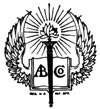E-text prepared by Melissa McDaniel
and the Online Distributed Proofreading Team
()
from page images generously made available by
Internet Archive
(http://www.archive.org)
Transcriber's Note:
Obvious typographical errors have been corrected.Inconsistent spelling and hyphenation in the originaldocument have been preserved.
| Note: | Images of the original pages are available through Internet Archive. See http://www.archive.org/details/sourcebookofmedi00oggfuoft |
A SOURCE BOOK OF
MEDIÆVAL HISTORY
DOCUMENTS ILLUSTRATIVE OF EUROPEAN LIFE AND
INSTITUTIONS FROM THE GERMAN INVASIONS
TO THE RENAISSANCE
EDITED BY
FREDERIC AUSTIN OGG, A.M.
ASSISTANT IN HISTORY IN HARVARD UNIVERSITY
AND INSTRUCTOR IN SIMMONS COLLEGE

NEW YORK · : · CINCINNATI · : · CHICAGO
Copyright, 1907, by
FREDERIC AUSTIN OGG
Entered at Stationers' Hall, London
W. P. 4
PREFACE
This book has been prepared in consequence of a conviction, derivedfrom some years of teaching experience, (1) that sources, ofproper kind and in carefully regulated amount, can profitably bemade use of by teachers and students of history in elementary collegeclasses, in academies and preparatory schools, and in the more advancedyears of the average high school, and (2) that for mediævalhistory there exists no published collection which is clearly adaptedto practical conditions of work in such classes and schools.
It has seemed to me that a source book designed to meet the requirementsof teachers and classes in the better grade of secondaryschools, and perhaps in the freshman year of college work, ought tocomprise certain distinctive features, first, with respect to the characterof the selections presented, and, secondly, in regard to generalarrangement and accompanying explanatory matter. In the choiceof extracts I have sought to be guided by the following considerations:(1) that in all cases the materials presented should be of realvalue, either for the historical information contained in them or forthe more or less indirect light they throw upon mediæval life or conditions;(2) that, for the sake of younger students, a relatively large proportionof narrative (annals, chronicles, and biography) be introducedand the purely documentary material be slightly subordinated; (3) that,despite this principle, documents of vital importance, such as MagnaCharta and Unam Sanctam, which cannot be ignored in even the mosthasty or elementary study, be presented with some fulness; and (4) that,in general, the rule should be to give longer passag